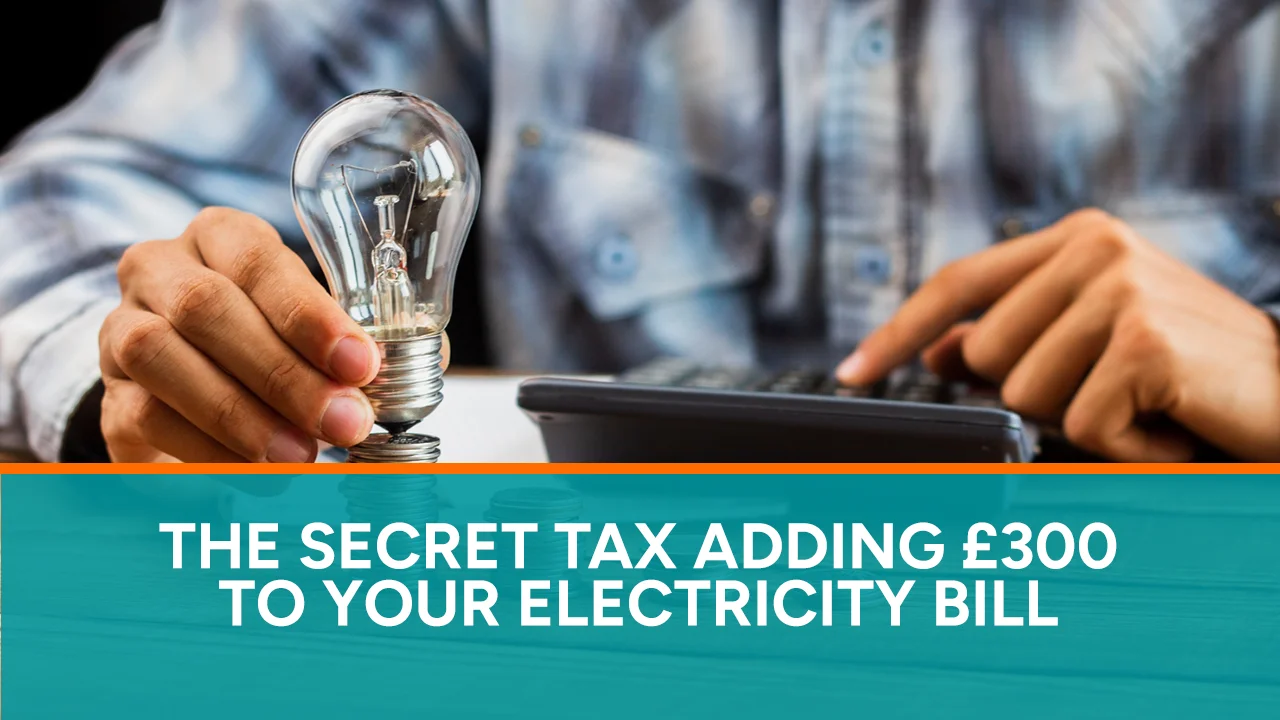Did you know that a hidden cost is raising your electricity bill? Many UK households try to save money by switching providers, using energy-saving light bulbs, or lowering the thermostat. However, few realise that up to 16% of their bill comes from outdated taxes. This little-known electricity tax can cost families up to £300 a year, no matter how much energy they use or their income.
Hidden taxes are increasing electricity bills across the UK, and many people don’t even know about them. These charges were introduced years ago and still affect energy prices today, even though electricity generation has changed. For families dealing with rising living costs, understanding these high bills is crucial for saving money.
What Is the Electricity Tax UK Households Are Paying?
The term “electricity tax UK” describes various social and environmental fees added to your electricity bill. These fees started over 20 years ago to support renewable energy projects and energy-saving programs. Back then, most electricity came from coal or gas, so taxing electricity made sense as it reduced harmful emissions.
Now, the situation has changed. The UK generates much of its electricity from renewable sources like wind and solar power, which are cheaper than fossil fuels. However, the old taxes still appear on your bill. Instead of encouraging clean energy use, the current system punishes consumers.
These taxes add about £100 to £300 to your annual bill, depending on your usage and if you mainly use electric heating. Since the taxes are based on a percentage, using more electricity “no matter how green” means you pay more tax.
Why Does the UK Have Such High Electricity Bills?
People often ask us, “Why are our electricity bills so high compared to other countries?” The UK has some of the highest electricity bills in Europe, not because generating electricity is expensive, but because of heavy taxes on it.
Global energy prices have risen due to political issues and supply chain problems. However, the UK is unique because we tax electricity more than gas. This makes electricity about four times more expensive than gas, even as we try to switch to electric systems like heat pumps and electric cars.
This situation creates a market imbalance. When people see gas as cheaper, they are less likely to choose electric heating, even though it is more efficient and better for the environment. We need to fix this pricing issue urgently.
The Impact on Fuel Poverty UK Households
Low-income families suffer greatly from these taxes. Many people in fuel poverty in the UK can’t choose how to heat their homes. They often live in older or rented homes that use direct electric heating, like storage heaters or electric radiators.
These homes rely mostly on electricity, which means they pay much higher energy costs than households with modern gas boilers. This creates an unfair system where the poorest families pay the most. It’s not just unfair financially; it’s also wrong socially and morally.
The worst affected are often elderly pensioners, disabled residents, and single-parent families, those who should be protected from high costs. Removing electricity taxes would help reduce energy inequality and tackle fuel poverty directly.
Heat Pump Electricity Cost: A Missed Opportunity
Let’s discuss heat pumps, which the UK government promotes as the future of home heating. These devices can be up to four times more efficient than gas boilers, using air or ground heat to warm homes.
However, high electricity taxes make heat pump costs unappealing for many homeowners. Instead of lower bills from efficiency, many find their costs are even higher. This discourages people from adopting heat pumps and reduces trust in green options.
Although there are subsidies and grants to help with installation costs, homeowners care more about daily running costs. Without tax changes, we are asking families to make a costly switch for little benefit. This weak case slows down the green transition.
Electricity vs Gas Cost UK: The Unfair Comparison
The current pricing system makes gas seem like the cheaper and more reliable choice, but electricity is actually cleaner because a lot of it comes from wind, solar, and water sources. However, old taxes make electricity look too expensive. This creates confusion in the debate over electricity and gas costs in the UK. People who install electric heating systems end up paying more, even though they are making a good choice.
We need to stop punishing people for choosing green options. Changing how we tax electricity will create fairer prices and encourage sustainable choices. It’s not just about saving money; it’s also about promoting good environmental habits.
The Solution: Remove Electricity Taxes and Save £300
Energy experts and economic analysts suggest that the best solution is to eliminate electricity taxes and include those costs in general taxes. This method is fair because higher earners pay more, while lower-income families receive significant relief.
Removing these taxes could save households up to £300 a year if they use electricity for heating and about £130 for those using both gas and electricity. The average UK household spends over £1,200 a year on energy, so this would be a big saving.
Additionally, this change would help the government meet its net-zero targets and reduce carbon emissions across the country. It benefits both your finances and the environment.
Green Energy UK Needs the Right Incentives
We are in a strong position. The UK is a leader in green energy, with renewables now supplying over 40% of the national grid. Offshore wind energy has grown rapidly and is often cheaper than gas electricity.
However, the tax system is outdated. Even though green electricity is cheaper to produce and better for the environment, consumers still pay high prices due to old taxes. It’s like taxing salads more than fast food; it doesn’t make sense.
Policymakers need to adjust taxes to support environmental goals. Lowering or removing electricity taxes will increase demand for clean energy technologies, like EV chargers and smart thermostats, and encourage long-term use.
How UK Households Can Push for Change
We all have the power to make change. Whether you own or rent your home or use gas or electricity, your opinion matters. Public pressure is key in influencing policy.
Campaigns like the MCS Foundation’s help you easily contact your local MP and ask for changes. These efforts educate people and hold leaders accountable for bad policies. Supporting them takes just a few minutes and could lead to long-term savings on energy bills in the UK.
You can also share information on social media, sign petitions, or talk to your neighbours and friends. The more we spread awareness, the harder it is for policymakers to ignore us. Together, we can start a national conversation that leads to real change.
What Clarkwell & Co. Recommends for Households
At Clarkwell & Co., we do more than just accounting in London. We help families improve their financial health. Our team can help you track utility costs and find wasteful habits so you can make smarter, greener choices.
We encourage households to check their energy bills regularly. Are you eligible for a grant? Could a home audit help lower your bills? Would a smart meter make your usage clearer? We answer these questions daily as part of our accounting services.
As one of the most innovative accounting firms in London, we support cleaner energy and fairer taxes. If you want personal advice on energy budgeting, green upgrades, or household efficiency, we’re here to help.
It’s Time to Rewire the System
The need to change the electricity tax for UK households is urgent. Our current system does not match our energy needs and punishes those who choose low-carbon options.
By eliminating old taxes and moving costs to general taxes, we can make energy savings possible for everyone, not just a select few. It’s time to update our pricing, encourage green choices, and help those who are struggling.
At Clarkwell & Co., we want to help our community understand their finances better. If you need personalised advice on energy costs, budgeting, or sustainable investments, reach out to our expert accountants in London today.







